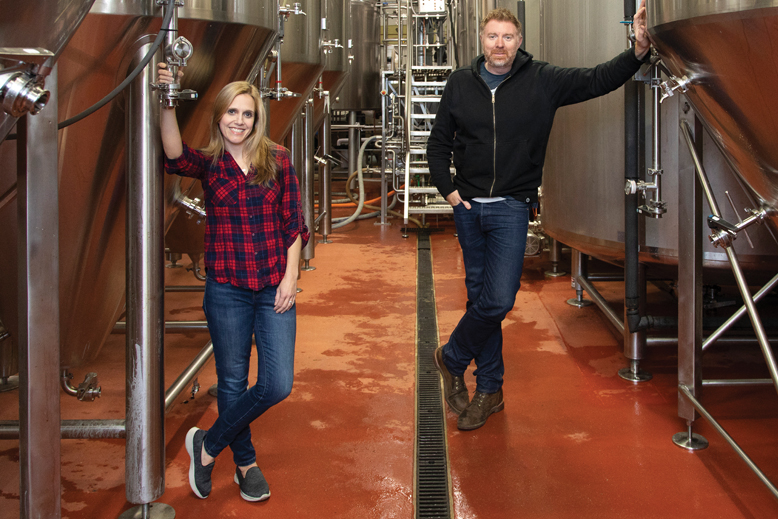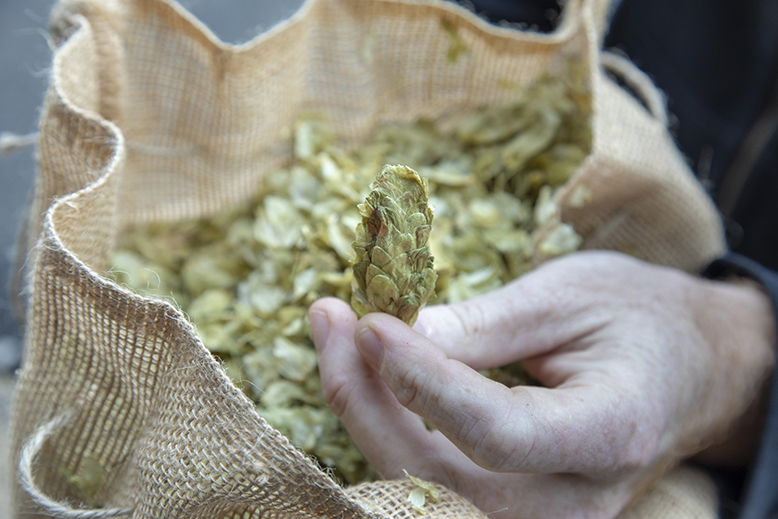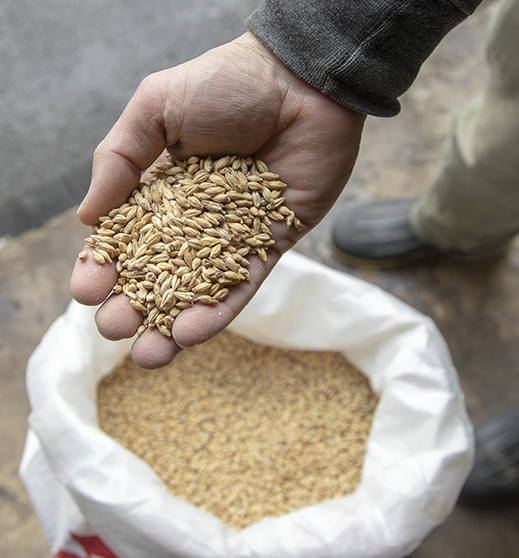
Photo by Scott Jones
What makes a great company? In any business, greatness requires a commitment to quality. In the brewing business, you can add creativity and consistency as essential factors. It seems like a simple formula, but not everyone gets it right.
In New Jersey, Kane Brewing Company has been setting the standard for quality, creativity and consistency almost since the day it brewed its first commercial batch. For this beer issue, a New Jersey Monthly panel of 14 independent beer experts voted Kane the best brewery in the state.
Kane Brewing opened in Ocean Township in 2011, the product of a husband-and-wife team who left New York corporate jobs in finance and marketing, respectively, to pursue a dream of owning their own business. It was a pivotal year for New Jersey craft beer. The prior year, the state had fewer than 20 breweries and brewpubs, according to the New Jersey Craft Beer website.

Kane stands out for its consistency and superior quality in its three flagships, Head High IPA, Overhead DIPA and Sneak Box pale ale. Photo by Paul Sirisalee
Three significant breweries opened in 2011: Kane, Carton Brewing in Atlantic Highlands and Cape May Brewing. The founders of those breweries quickly emerged as high-profile industry figures—on the political/lobbying front, in the media, and among craft beer lovers whose numbers began growing right around the same time.
As those breweries opened, craft beer was moving into the mainstream in New Jersey. Taprooms appealing to craft-beer fans became an exciting part of the state’s nightlife, and quality artisanal brews began to make their way onto beverage menus and store shelves. Beer festivals blossomed. And after Trenton passed a law in 2012 that significantly lowered the barriers to entry for brewers and made it easier for them to make money from their tasting rooms, the state’s beer boom was off and running.
In March 2013, when New Jersey Monthly published its first cover story on craft beer, we reported that there were 27 craft breweries and brewpubs in the state. When we came back to the subject with a March 2016 cover story, the number had grown to 43 craft breweries, plus 15 brewpubs—with 40 more breweries in the pipeline. Today, New Jersey Craft Beer, a membership-club website, lists 99 production breweries, 18 brewpubs and 27 breweries awaiting approval to launch in New Jersey. According to Chicago-based C+R Research, New Jersey and Kentucky are the fastest-growing beer states in terms of number of breweries added since 2015.
Despite the rapid growth, New Jersey still lags in a number of ways. As of 2017, the Brewers Association, a trade group, lists New Jersey at 45th of 50 states in breweries per capita and 21st for number of breweries overall. In terms of economic impact, New Jersey ranks a respectable 16th.

Kane Brewing’s Michael Kane checks on some barrel-aged beers. The brewery ranked number 1 in our poll of beer experts. Photo by Scott Jones
Michael Kane’s beer obsession goes back to his home-brewing days as a college student in Connecticut. The hobby continued into the early years of his marriage, cramping the 500-square-foot Manhattan apartment he shared with his patient wife, Erika.
“I spent a lot of time on it, taking notes, writing recipes, making the beer, serving it in the right glass, making sure the lines were clean in my little kegerator at home,” Kane says. “It became one of those all-consuming things, from reading home-brewing magazines to saying, ‘Now I’m going to work on yeast, now I’m going to work on my mash.’”
Kane considered a career as a brewer, but decided to get an MBA instead. Still, Michael and Erika kept visiting breweries and picking brewers’ brains. Kane never stopped reading about the business and the technicalities of brewing. Even today, beer books line a wall in his office. “I love reading those books,” he says. “I love the marketing, the business, brewing. I’ll read anything about beer.”
The Kanes moved back to New Jersey, Michael’s home state, to finally open their brewery in a leased warehouse space. Erika kept her day job—she didn’t join the business until 2016. Michael hired a brewer and brought in high school buddy Glenn Lewis to handle sales. The brewery didn’t dedicate much space to a tasting room because it would be another year before Trenton passed a law to allow on-site pint sales. Then, as now, Kane distributed its own beer across New Jersey.
The reaction to Kane’s beers was almost immediate.
“People go crazy over Kane,” says Dana Russo, a certified cicerone (beer sommelier) and bartender at the craft-beer-centric Cloverleaf Tavern in Caldwell. “Due to its number in sales and requests of our guests, we have made Head High [IPA] one of our permanent beers on the lineup and most times also have Sneak Box [pale ale] on as well. I have been bartending at the Cloverleaf for over 10 years and in my time have never seen a brewery gain as much popularity as Kane has.”
Supporting our thesis, Russo attributes Kane’s popularity to “quality, consistency and creativeness.” She adds that the best brewers “pay close attention to detail and nail the guidelines of each style over and over again.”
Commitment to quality is a frequent theme in Kane Brewing’s success story. Example: Both Kane and Lewis, who is now vice president of operations, emphasize that they’ll dump a batch of beer that tastes less than exemplary down the drain. But those occasions are rare.
Lewis says Kane continues to keep a hand in almost every aspect of the operation. Although Kane spends most of his time on high-level functions like strategic growth, infrastructure improvements and supplier contracts, he still walks the production floor, writes or approves every recipe, tastes each batch, and helps man the bar if the tasting room gets crowded on a Saturday. Kane will splurge on a highly efficient and precise piece of equipment (like a centrifuge to filter the beer) and never substitutes one ingredient for another—a practice that is commonplace among brewers in a volatile agricultural market.
“It’s human nature to cut corners or take a shortcut, but quality is a cultural thing here,” Lewis says.

Photo by Scott Jones
It helps that many members of Kane’s production team have graduated from brewing school. Others either worked their way up the ladder at Kane or came from well-regarded out-of-state breweries. And as is true at most craft breweries, they all love beer.
“I’m always amazed at the level of detail that these guys know,” Lewis says. “Tweaks that these guys know make a big difference.”
Naturally, good brewing talent can be hard to retain. A number of brewers have departed Kane to open their own breweries or join another as head brewer. Among them are Matt Czigler, owner of Czig Meister Brewing in Hackettstown, and Joe Correia, owner of Torch & Crown Brewing Company in New York.
That’s just one headache for Michael Kane. Growth is also a big issue. To date, he has kept distribution within New Jersey, although there is likely demand for his beer in the neighboring states.
At the moment, Kane is just trying to keep up with demand from existing accounts. The company has leased a second building to house office space and a new aging and souring facility, and has moved packaging materials and keg storage off-site. But Kane desperately needs more tanks and really wants to upgrade his tasting room. Currently, the public area consists of a tiny retail shop, a bar, and a bunch of tables in the same area as his brewing equipment. They get shoved out of the way during the work day, making it challenging to open more than four days a week and earlier than 4 pm on weekdays.
For now, Kane continues to grow his product line. His latest project involves barrel aging and souring beers with wild yeast strains that his full-time barrel and mixed-fermentation manager (a sort of yeast whisperer) cultivates from the ambient air. This past fall, he developed his first batch of beer spontaneously fermented in a long, shallow, Belgian-style vat called a coolship, whose open top allows the liquid inside to capture airborne yeast and bacteria. Kane may be one of only two New Jersey breweries to own such equipment (the other being the Referend Bier Blendery in Pennington). Kane hopes to release the first of 10 mixed-culture batches this spring; spontaneously fermented beers will follow.
Why did he wait until barrel aging and wild fermentation had become more widespread to launch his own program? Kane’s answer is characteristic.“We got to the point where we had manpower, money and time,” he says. “I’m not concerned about being the first to do something. I want to wait until we can do it right.”

Photo by Scott Jones
Kane caused some controversy in 2017 when he and a number of his colleagues left the New Jersey Brewers Association, where he had previously served as a board member. Following their departure, he and seven other brewers founded the competing Brewers Guild of New Jersey. Some observers cite personality conflicts and political differences as causes of the split. Kane says the new organization better suits his brewery’s needs. Whatever the case, the move has cleaved the state’s craft-brewing community and left it trying to lobby Trenton on key issues without a unified voice.
“It’s not about who’s right or who’s wrong, it’s about who would represent us,” says Kane. “There are big challenges facing the industry.” Among those issues: off-site sales opportunities, franchise reform and potential competition from legalized marijuana.
One of Kane’s current projects is to convince the state liquor control board to let him host an off-site festival to showcase various breweries, including some that don’t distribute in state. To help with that, he got a distributor’s license last summer and suspects he’ll one day distribute other brewers’ beers.
Of course, Kane can be expected to wait until the moment is right. Any new initiative shouldn’t distract from bigger priorities, like getting every single beer right every single time.
“I don’t know what the secret is to saying you care about quality and getting the execution perfect,” says Lewis. “But that’s really what it is here.”



